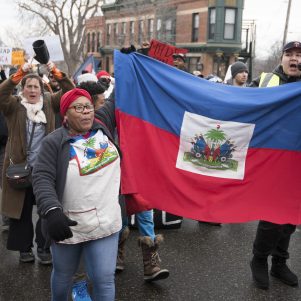The Sunday premium wage: A ‘blue law’ not even the Puritans would like
By David G. Tuerck and Brittany Turner | April 19, 2016, 8:19 EDT
 New England Puritans (Wikipedia)
New England Puritans (Wikipedia) If you go to Boston.com you can find examples of behavior prohibited by colonial-era blue laws that are still on the books in Massachusetts – among them, kissing in public, wearing gold buttons worth more than 200 British pounds, and being an idle “tobacco taker.”
One blue law of much more recent origin compels retail businesses utilizing at least seven workers to pay Sunday and holiday wages that are one-and-a-half what they pay on normal weekdays. No other state, except Rhode Island, mandates this sort of Sunday premium wage. The Massachusetts Sunday premium wage is motivated, not by Puritanical values, but by a union-driven campaign to drive up worker costs as high as the legislature will allow.
The problem for retailers – as well as their employees — is that this Massachusetts law takes an extra bite out of profits in what is already an economically punishing environment. It combines with other factors to make it increasingly difficult for Massachusetts retailers to stay in business. One of those factors is the comparatively high state minimum wage.
On January 1, Massachusetts raised its minimum wage from $9 to $10 per hour. It will raise it again, to $11 per hour, next January. A recent article in Investors Business Daily reveals how the latest increase is affecting employment in the state. Massachusetts “is now mired in its longest stretch of net job losses since the recession in both the retail and the leisure and hospitality sectors,” says the article. The retail sector is down 2,200 jobs from its July 2015 post-recession peak. Another indicator is the decision by Macy’s to close two of its Massachusetts stores – one in Lanesborough and another in Springfield.
One reason for all of this is that, under Massachusetts law, stores have to pay time-and-half on Sundays. Taken together, the minimum wage and the Sunday premium wage put Massachusetts retailers at a competitive disadvantage relative to the Internet and to neighboring states. Internet retailers can offer discounted prices, and they don’t have to pay premium wages on Sundays.
By contrast, New Hampshire has a minimum wage of only $7.25 per hour, and it has no Sunday premium wage and no sales tax. There is simply no point in having Sunday shopping hours if you are trying to run a small retail business in northern Massachusetts.
While there has been copious research on the effects of the minimum wage, little is known about the Massachusetts Sunday premium wage. In an effort to provide some insights, the Retailers Association of Massachusetts worked with us to take an informal survey of its members on how repeal of this statute might affect the hours and pay they offer their workers. The results are as follows:
— Of the 69 respondents, 49 are open on Sundays. Of those, 31 (63 percent) would hire more workers if the premium wage were repealed;
— Of the 31, the average number of new workers that would be hired is four;
— Of the 49 stores open on Sundays, 18 (37 percent) said they would increase their workers’ wages if the law were repealed;
— Of the 18, the average rise in wages, Sunday through Saturday, would be $1.35 per hour
This is a small sample, but it suggests that the state legislature needs to start questioning the idea that the Sunday premium wage protects workers. The legislature needs to ask whether it is in the interest of workers and the state to impose this additional burden on Massachusetts retailers.
The surging political popularity of the $15 minimum wage illustrates the mindset of an electorate that sees the retail sector as a hunting ground for business profits to be redistributed to the 99 percent.
The problem is that many small retailers are themselves part of the 99 percent. Massachusetts retailers, most of whom already pay wages above the minimum wage and operate on the tightest of profit margins, are not the place to look if the goal is to find money for working families. In this economic environment, it makes no sense to further burden Massachusetts retailers with a blue law that has nothing to do with respecting the Sabbath or protecting workers and everything to do with the empowerment of unions that gather strength by denying work opportunities to low-wage income earners.

Brittany Turner and David G. Tuerck
David G. Tuerck is executive director of the Beacon Hill Institute and professor of economics at Suffolk University. Brittany Turner is a graduating senior at Suffolk.
NBPEconomic











